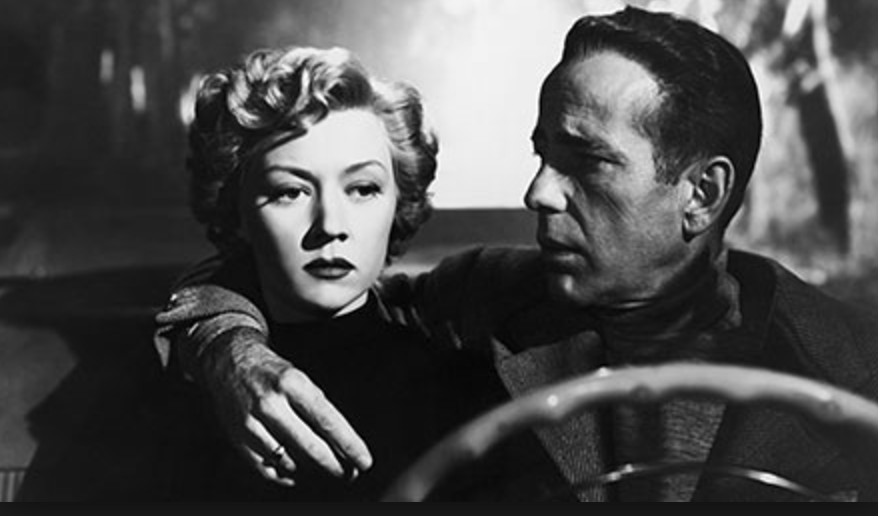When most people talk about Nicholas Ray’s rendering of In A Lonely Place, they like to preface it with how dark and tragic the story is. From the present standpoint, however, there doesn’t seem to be anything that upsetting about aspiring actress Laurel Gray (Gloria Grahame) leaving Dix Steele (Humphrey Bogart, who always looks gross when his aged skin is placed against the various young ingenues he got to star alongside). What’s more, in the modern era, it’s also hard to keep a straight face when the name “Dix Steele” is mentioned, especially when Laurel coos, “I love Dix.”
Based on Dorothy B. Hughes’ 1947 mystery novel, the often meta scenes throughout the film (e.g. Dix talking about how to write a great scene depicting love through two people via subtlety or Dix’s script differing entirely from the book he’s basing it on) pay specific homage to the ways in which adaptations can be dicey, as well as the dangers of falling prey to Hollywood dreams. In In a Lonely Place‘s case, its filmic adaptation actually proves to be far more on the lighter side than the novel, which portrays Dix as a bona fide sociopath only feigning attempts at being a screenwriter. The one element that remains unchanged, however, is Laurel’s ultimately skittish reactions to Dix’s erratic temper, immediately established in the movie’s opening with his readiness to fight a man in the car next to him.
Headed toward celebrity watering hole Paul’s (blatantly the Brown Derby), Dix meets up with one of the last people who will tolerate his fickle nature, Mel Lippman (Art Smith)–and that’s only because he’s Dix’s agent. Hoping to get a fresh ten percent out of him, Mel urges Dix to adapt a popular novel with, shall we say, trash romance sensibilities. The coat check girl, Mildred Atkinson (Martha Stewart, no not that one), just so happens to have read the book, and tells Dix as much as he enters the bar/restaurant. “Unusual” non-gentleman that he is, Dix asks Mildred to accompany him back to his house to tell him the story, as he has no intention of ever reading it himself.
On the way into his apartment at the Beverly Patio Apartments (the interior of which looks far more like a house), Dix encounters Laurel, who he has, up until now, never seen before. Their locked gaze seems to affect Dix, which is saying a lot since he’s generally pretty unaffected. One can envision this to be the similar exchange that occurred between Sean Penn when he saw Madonna for the first time on the set of the “Material Girl” video. The electric sparks that fly when an abusive person sees a woman whose shining light he’s about to dim.
As the facts of Dix’s volatile past come out when a police investigation is conducted in the wake of Mildred’s body being found thrown in a ditch–somewhere in a lonely place–Laurel begins to wonder if she should have served so readily as an alibi, particularly now that she’s become emotionally invested. Fran Randolph (Alix Talton), one of his exes who apparently reneged on a statement saying he beat her up, echoes the path Madonna took back in 2015 to support a defamation lawsuit Penn launched against director Lee Daniels, who, in defense of Terrance Howard, then under fire for domestic violence, offhandedly remarked that it was nothing Marlon Brando or Sean Penn hadn’t done before. Knowing the depths of Madonna’s love for him, Penn enlisted her to give the statement, “Specifically, I am aware of the allegations concerning an alleged incident that occurred in June, 1987, whereby (according to tabloid reports), Sean allegedly struck me with ‘a baseball bat.’ I know the allegations in those and other reports to be completely outrageous, malicious, reckless, and false.”
Oh, how love–even the lost kind–can make us do things we really oughtn’t. In Laurel’s case, observing Dix’s vacillation between utter stoicism (Dix quips that the police captain really shouldn’t fret over this character trait “unless you plan to arrest me on lack of emotion”) and belligerent rage. This manifests most clearly after Laurel gets caught in a lie and Dix chooses to take out his aggressive anger on another man driving (always another man driving), pummeling him nearly to a pulp until Laurel’s urgent screams stop him from going too far. This, too, mirrors the Ciccone/Penn relationship, with Madonna constantly shouting for Sean to cease his attacks on various members of the paparazzi, whose favor and attention she, in direct contrast, relished.
With a tragic outcome built into every film noir and celebrity romance, In A Lonely Place proves no different, for it’s almost an exact replica of the Poison Penns’ marriage. And yet, one can find a far more macabre narrative in Billy Wilder’s Sunset Boulevard or Ace in the Hole. Or in Madonna’s eight-year marriage to Guy Ritchie.





















